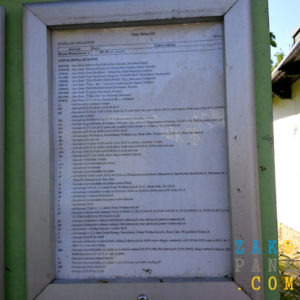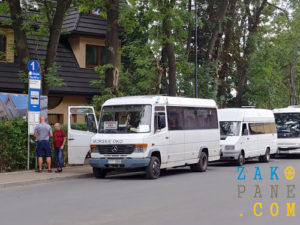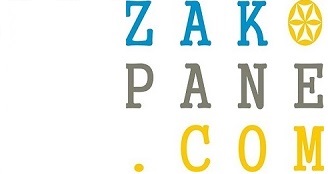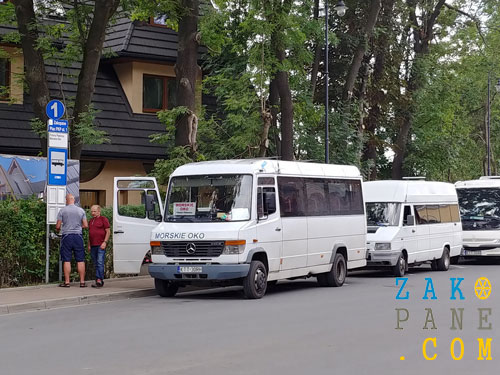Are you going to Giewont?
Although the title refers to the popular jokes that highlanders make of “ceprów” (tourists), we promise, we will not laugh at anyone here. On the contrary, we will try again to address the secrets of communication in Zakopane and generally moving around the city. We are aware that for someone who came here for the first time it is not easy. Especially residents of large agglomerations may have problems with accepting differences in the standard and availability of transport. At the same time, it is in the interest of everyone – both locals and tourists – that as many people as possible leave their private cars in their homes or in hotel car parks. Therefore, do not give up on public transport. But read the following tips carefully.
The apple of mayor’s eye and a necessary evil.
The first, as you can probably guess – is public communication. The pride of the Zakopane authorities. Perhaps a bit premature, about what in a moment, but let’s be glad that it is at all. The latter are buses of private lines and bus drivers. Public transport has two lines, numbered 11 and 14. For now, they move around the circle in two directions, which causes some confusion at the bus stop in the vicinity of railway and bus stations. Even the local ones sometimes get into the 11th driving to Krzeptowki, while they wanted to get to Cyrhla. You must read the texts displayed at the front of the vehicle. And ask, ask, do not hesitate. A similar rule applies to private buses – drivers are used that majority of people, before they get in, ask: “can get I to Olcza, to Pardalowka, to Poronin?”.

Timetables at one of the bus stops. It seems that there are countless routes, but many of them are valid only during the selected period of the year. It also happens that the bus just will not stop, so you have to stand at the curb, look for vehicles with a white plate behind the windshield and wave.
How to get back home from Krupówki?
Perhaps the most problematic point is the junction at the intersection of Aleje 3 Maja and Kosciuszki, in the vicinity of Krupówki. Stops are located on two of the four corners of the intersection and many people are confused about the directions. Simply put, if we want to go “down” Zakopane – in the direction of Koscielisko, Chochołowska Valley, Gubalowka, as well as to towns located on the road to Krakow, like Poronin, or the extreme districts of the city like Harenda, Ustup – we have to choose a stop, on which we stand behind the funfair, and in front of us we see the Granit department store with the big logo of Cafe Tygodnik Podhalanski. Orla Perc is on our left. The stop is called Aleje 3 Maja Dolne. If we are going “up” – means to Kuznice, to Morskie Oko, Cyrhla, Skocznia, Dolina Białego or Strazyska – we get on the bus stop where we have the entrance to the shopping mall Krupowki 29 and a bright red Sushi signboard behind us our sight falls on small houses with a gallery of paintings and, a little to the right diagonally, the upper Rownia Krupowa. Orla Perc, for a change, we have on the right hand. And the stop is called Aleje 3 Maja Gorne. Let us remember!
Map and reflexes
The rule is that we should not get on the bus without first getting a rough overview of the map. Marks of bus routes visible in schedules at stops are really short and if we do not get off at the last stop of the bus route, we need to know what is the stop where we want to get off, whether it is rather on the route to Dzianisz, or maybe to Koscielisko. Why is it important? Because drivers, attention !, do not stop at every stop. If the bus is full of people and you do not call ahead “I will get out now!” – 80% of drivers will not even slow down. Of course, we can ask for a stop in a convenient place for us while getting in , but there is no guarantee that the driver will remember it. The situation of people waiting somewhere in the middle of the route is unenviable – you can helplessly watch the buses passing the stop, which no longer take passengers, because they are full. Drivers have the habit of exceeding the number of passengers allowed for a given vehicle, the standard is “standing places”, and it still does not solve the problem of too few places. However, if we got on the bus happily, let us be vigilant and let us announce the willingness to leave it in advance. The toll is usually paid when getting off and in Zakopane it is 3 PLN per person, there are no discounts for children.

This is what the legend looks like for a timetable on a typical Zakopane stop. Therefore, when planning an evening return, or leaving early in the morning – it is better to get acquainted with it earlier, if you need help ask at your hotel or your hosts.
Do not let roots grow
The most popular destinations are: Palenica – Morskie Oko and Koscielisko – Dolina Koscieliska and Chocholowska. Going there, it is best to get to the stop at the station. The drivers will not move until they have a set of sitting passengers, which means that people getting on next stops are forced to stand, as long as – as mentioned above – the bus stops at all. It also happens that drivers shorten their routes during traffic jams and skip carelessly for a few stops, not caring for potential passengers who are dying somewhere off the beaten track for an hour, staring intently at the timetable. Schedules have to be read very carefully, each one has a legend that includes several dozen items. Missing a small letter at the time of departure results in the hope for the arrival of a bus, which will inevitably arrive in 5 minutes … and five months, because, for example, so much remains until the winter holidays which are the only time for this route of this bus. If we do not have the patience to study the timetable at the bus stop, just ask other people, there will definitely be someone who will explain everything to us.
With music and fantasy
Buses are difficult to consider a comfortable transport, you can dream about air-conditioning, and the squeeze, low ceiling and driving fast on the bends make many people dizzy. These vehicles often are not new, comfortable and spacious and not all the drivers keep them very clean. In all of them, the radio plays loudly – sometimes national and sometimes local “Radio Alex” broadcasts, which proposes highlander bands alternately with highlander-disco. It is accepted to talk to the driver and you should not be surprised when he turns to us gesticulating – driving without looking at the road, they could drive with their eyes closed. However, we have to be thankful – if not for them, most tourists would not have the chance to reach either Palenica Bialczanska, where the road leads to Morskie Oko, or to Kuznice, where there start numerous trails and a cable railway to Kasprowy Wierch.
Parking lots fill up quickly and access by private car is the privilege of the few. It is not allowed to enter Kuznice by car at all. Similarly, the Koscieliska and Chocholowska valleys would be inaccessible. Of course, we are not mentioning taking a taxi. We will not get to all these places by public transport. The buses are modern, elegant, low-floor, have ticket machines (payment only with coins), but their routes include only the city. And the frequency of running puts patience to a hard test. Let’s admit this, buses every 70-80 minutes are not frequent enough.
Like Cinderella at the ball
A good habit is checking the last departure of the bus in the evening in the direction we are interested in. People accustomed to metropolitan communication may be unpleasantly surprised by the last bus at 22.15 or even at 19:30. And if we do not make it, will we spend the night in the tavern? Later there are only taxis left. A sample taxi route from the center to Harenda (2 km from the city borders) at night is 35-40 PLN. Similarly, if we are going, for example, to the Koscieliska Valley – let’s check what time we can return to the center. It is 12 km, what means a fairly tiring distance after a day trip, and it happens the last bus is at 18:30.

Buses to Morskie Oko leave from station no. 1. For 10 zlotys we will take them to Palenica Bialczańska. Walk to the lake 9.5 km and around the lake for free 😉 (you pay only for entrance to the Tatra National Park)
A walk for health and for warming up
There are many places in Zakopane, where we cannot get any communication, either public or private. People living in Zakopane walk a lot and are not scared of distances in the order of 1.5-2 km. Here and there, we can see the phantom-stops, for instance on Chalubinskiego or Pilsudskiego Streets, where no buses have been driving for years. They probably did once, but they were not popular enough, so these routes were deleted. (Sometimes they appear seasonally, for example, to Kuznice currently are buses but they bypass the city center and go Jagiellonska straight up from the iconic FIS bar next to the station.) Necessary tourist equipment is a map where you can check how far from the nearest transport route there is an object of interest to us. At the stall next to the station you can buy a map not only of the mountains, but also a map of the city, which often has a legend in several languages.
A tourist center was also created next to the said FIS bar, where you can learn a lot of things, buy publications about the city, etc. Let’s also ask about it in the place of our accommodation, the staff will be happy to help. The residents of the city usually do not have the patience to wait, it is not worth paying 3 zlotys for driving on a bus one stop, so usually, if they do not drive a car, they cover short distances on foot. It has many advantages. In winter, no one is freezing, the walk along the sidewalk covered with snow will results in opening the coat and removing the scarf after a maximum of five minutes of walking. Movement triggers endorphins, instead of getting angry, you can walk for health and fitness.
The city’s advices
Of course, we can ask for details at tourist information points, there are several of them in Zakopane. They will certainly give us comprehensive advice on transport. The problem is, however, the short opening time of these points, up to a maximum of 19:00 and on Sundays not at all. However, bus timetables with the schedules, updated on a regular basis are also on the city’s website at: https://www.zakopane.eu/informator-turystyczny/nowe-rozklady-jazdy
Seasonal difficulties
Of the novelties that do not make life easier for tourists, it is necessary to mention the ban of entry to the bus and train station for taxi drivers and private vehicles. Unfortunately, to use a taxi, you have to go to the square in the back of Leclerc, that is, in the place where the bus station used to be, overcome the pedestrian crossing, as well as a crowded bus stop going towards Kuznice and Olcza. Somewhat better we will have on the way back, when we ask the driver of our taxi to use the kiss and ride parking lot, which was created spontaneously after the adverse decision of the Zakopane authorities regarding taxis and private vehicles within the station. This one is located near the entrance to the platforms under the neon station. And there we can park for a minute, if there’s space. Behind the railway platforms there is also a “wild” taxi stand, where probably taxi drivers –asking each traveler if there is a need for transport– will try to take us. It is not far away, the platforms connect with the square with a narrow path at the end of the tracks.
For pedestrians
At the end, a curiosity. On most of Zakopane houses you will not find a plate such as f.ex. in other places, where the street name and house number will be. Only the numbers are displayed. Therefore, as long as we do not stand at a larger intersection, which tells us which street we are entering, it may happen that we will not be sure exactly where we are. Do not be ashamed to ask a passer-by, the Zakopane people themselves are aware that the home labeling system rewards locals. And, second note – take seriously road signs for cars with a dead end. Most often it also means that there is no possibility of using a short cut for pedestrians, the street is simply a closed by fenced estates. Such traps can be found, for example, at Chramcowki near the Witkacy Theater, and between Krupowki and Aleja 3 Maja, near parking lots. To avoid wasting time when circling between homes, let’s rely better on the main communication routes.
Transport with a human face
What is most important in using public transport in Zakopane? Patience, prudence and sense of humor. Let’s not mess up your vacation, just let’s get ready that this system is far from perfect. In the end every year, tens of thousands of tourists try not to get lost in the city and the surrounding area – and most are successful. As a benefit we have integration with the locals, we can soak up the atmosphere of a small town. Here the bus driver is always told “good morning”, very often people greet each other warmly, because they use the same route for years. Drivers have a good memory for the face and often get to know the tourist whom they have already taken once, so why not to ask them how the trip went. There will be no door tripping, driving away from your nose, or a fight for a seat. Often, on the contrary, the driver will wait for someone who runs towards the bus. However, it is not necessarily possible to persuade the driver to stop outside the designated stop – the penalty for this is PLN 3,000. Even for the nicest tourist it is not worth risking. We, on the other hand, can take a vacation from the car and treat the adventure with local transport as one more entertainment of our stay.
Anna Markiewicz




